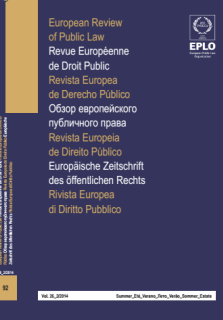
PUBLIC LAW AND SOLIDARITY
BULGARIA
RUMEN STEFANOV
PhD, Professor at the New Bulgarian University, Department of Political Science
Bulgaria consecutively develops its relations with the neighboring states as to the utilization of natural resources, which are common property or which it should under one or another form share fairly. In the elaboration and enforcement of such politics in the field, it is guided by the international as well as European principles and rules and according to provisions of bi-, tri- or multilateral regional agreements. Particular attention is paid on the communication (infrastructural) connections building, ecological balance preservation, common protection from natural disasters, mutual assistance to overcome the havoc they cause, sustainable development of the districts alongside the borders etc. As tools for the intensification of good neighborly relations, are utilized: active participation in internationally established commissions (ICPDR) and programs, exchange of information, joint experts groups, integrated natural resources management, joint meetings of public offices at different levels of governance, civil society enhanced monitoring and control over politics in the field etc. Despite the achievements marked so far, some unsolved problems still remain (postponement of Bulgaria and Romania's joining the Schengen area, insufficient investments in backward areas, gaps in the security management and structures, lack of unified European stand as to the technology for energy resources extraction etc.). These require not only the joint efforts of the politicians from the region but also more effective support from the part of EU institutions, as well as from the Western European countries.
La Bulgarie développe consécutivement ses relations avec les états voisins en ce qui concerne les ressources naturelles, qui sont une propriété commune ou qui devraient être partagées équitablement d'une façon ou d'une autre. Dans l'élaboration et la mise en œuvre de ce type de politiques dans ce domaine, elle est guidée par les principes et règles internationaux et européens conformément aux dispositions d'accords régionaux bilatéraux, trilatéraux ou multilatéraux. Une attention particulière est attribuée à la communication (infrastructurelle), la préservation de l'équilibre écologique, la protection commune à l'égard de catastrophes naturelles, l'assistance mutuelle pour que les dévastations qu'elles causent soient surmontées, le développement durable des régions frontalières etc. Sont utilisés en tant qu'outils d'intensification des relations de bon voisinage: la participation active à des commissions (ICPDR) et programmes internationaux, l'échange d'informations, les groupes d'experts conjoints, la gestion intégrée des ressources naturelles, les réunions conjointes des bureaux publics à divers degrés de gouvernance, la surveillance et le contrôle des politiques dans le domaine par la société civile etc. Malgré ces avancements, il reste encore quelques problèmes non résolus (le report de l'adhésion de la Bulgarie et de la Roumanie à l'espace Schengen, les investissements insuffisants dans des régions en retard de développement, les lacunes dans la gestion et les structures de sécurité, le manque d'une approche européenne unifiée en ce qui concerne la technologie pour l'extraction de ressources énergétiques etc.). Ceux-ci exigent non seulement les efforts conjoints des politiciens de la région mais également un support plus efficace de la part des institutions de l'UE, ainsi que de la part des pays d'Europe occidentale.





















